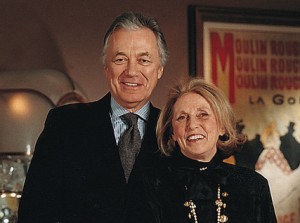A couple of weeks ago, the food world was rocked with the announcement that the beloved Food Arts magazine was closing. Heartbreaking to those in the food and beverage industry, Food Arts has been a  benchmark for trade publications with high standards and great content.
benchmark for trade publications with high standards and great content.
So, when Food & Wine magazine announced layoffs last week to refocus on their digital efforts, and rumors suggested more were potentially on the way, the irony struck me.
Food Arts and Food & Wine magazines were both founded by the talented Michael and Ariane Batterberry in 1988 and 1978 respectively. Both magazines were at the forefront of publishing and content at the time of their debuts – with Food Arts emerging as the premiere trade magazine for chefs and industry people alike, while Food & Wine magazine built on Gourmet Magazine’s offering, without the “stuffiness.”
In 1980, American Express Publishing bought Food & Wine magazine (and more recently Time Inc., last year), and M. Shanken Communications, Inc. acquired Food Arts in 1989. While they no longer played a role  at Food & Wine, both Michael and Ariane remained the publishers for Food Arts (Michael passed away in 2010).
at Food & Wine, both Michael and Ariane remained the publishers for Food Arts (Michael passed away in 2010).
The reason I’m writing about this instead of booze? These magazines, and more importantly these people, made me want to join the food and wine industry over a decade ago. I met Michael and Ariane Batterberry in 2004 at my first major wine industry event. While I knew their magazines, I did not truly understand the talent and history of these two amazing writers. My boss at the time said of them, “They are two of this industry’s greatest talents.”
Magazines like Food Arts will continue to live in the online world, as food writing is not going anywhere. Today’s blogs and websites would not be what they are today without the pioneering spirits of Michael and Ariane Batterberry (add to the roster Ruth Reichl, Earle MacAusland, and Julia Child, to name a few). Restaurant and food writing are so important because we live and breathe it every day. Author Michael Ruhlman said it best:
Telling stories about food and cooking is not only natural, it’s necessary for our survival. It’s important to understand how something that is essential to our humanity and our well-being affects all other aspects of our lives and our humanity.
While closings and layoffs seem almost standard procedure in the publishing world (with Ladies Home Journal shutting its doors earlier this year), it doesn’t get any easier. In fact, it gets harder. Yet, as I was mourning the losses, I realized there is a silver lining. It’s just getting interesting. These pioneers have laid the foundation for what’s to come, and I hope food (and beverage) bloggers of tomorrow remember who set the industry standard. While no one can live up to what Michael and Ariane Batterberry have accomplished, people can certainly try, and that’s what makes this industry so amazing.

